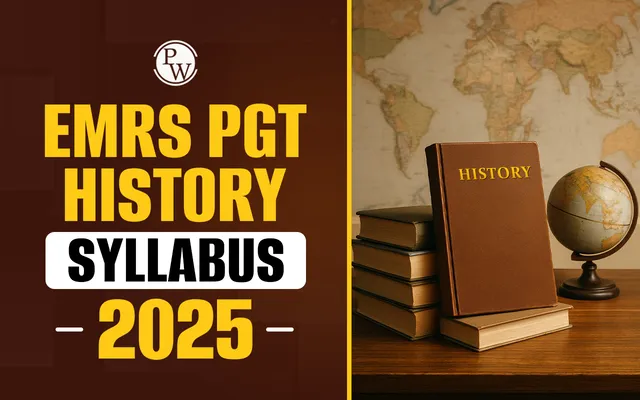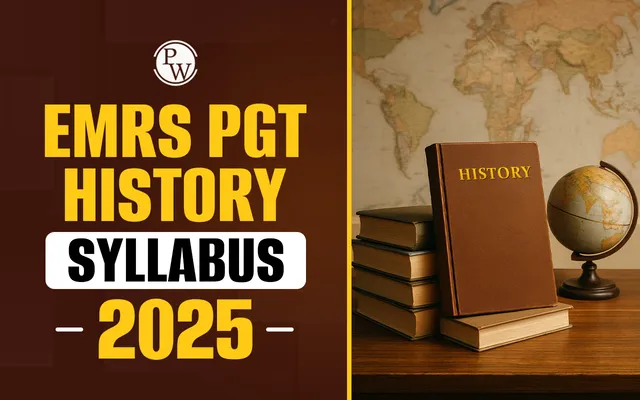

EMRS PGT History Syllabus 2025 must be prepared well by candidates who want to become Post Graduate Teachers in History at Eklavya Model Residential Schools (EMRS). The exam is conducted by the National Education Society for Tribal Students (NESTS). This recruitment aims to select qualified educators who can teach History at the senior secondary level.
EMRS PGT Recruitment 2025 evaluates both teaching aptitude and subject knowledge through a two-tier selection process. You should understand the syllabus, exam pattern, and marking scheme to plan your studies efficiently and cover all important topics.
EMRS PGT History Syllabus 2025
EMRS PGT History Syllabus 2025 has been officially released through the EMRS PGT Notification 2025. The syllabus is divided into Tier 1 (General and Teaching Aptitude) and Tier 2 (Subject Knowledge in History).
Tier 1 tests general awareness, reasoning ability, ICT skills, and teaching aptitude. Tier 2 focuses exclusively on History knowledge, including ancient, medieval, and modern India, world history, and historiography methods.
The Tier 2 syllabus ensures that candidates have comprehensive knowledge and the ability to present historical concepts clearly. You can download the EMRS PGT History Syllabus PDF to plan your study schedule unit by unit.
EMRS PGT History Exam Pattern
EMRS PGT History Exam is conducted in two tiers. Tier 1 evaluates general skills, reasoning, ICT, and teaching aptitude. Language competency is qualifying. Performance in Tier 1 determines eligibility for Tier 2.
Tier 2 is the Subject Knowledge Examination. Tier 2 is a subject-specific domain. It includes objective questions as well as descriptive questions:
| EMRS PGT History Exam Pattern | ||||
| Section | No. of Questions | Marks | Duration | Nature |
| Objective Questions | 40 | 40 | 180 mins | MCQs |
| Descriptive Questions | 15 | 60 | Short/Long Answers | |
EMRS PGT History Syllabus 2025 Tier 2 Units
EMRS PGT History Syllabus 2025 Tier 2 Units cover all key areas in Indian and World History. They ensure you have both factual knowledge and analytical ability:
-
Writing and City Life
-
An Empire across Three Continents
-
NOMADIC EMPIRES
-
The Three Orders.
-
Changing Cultural Traditions
-
Displacing Indigenous People
-
Paths to Modernization
-
Bricks, Beads and Bones
-
Kings, Farmers and Towns
-
Kingship, Caste and Class
-
Thinkers, Beliefs and Buildings
-
Through the Eyes of Travellers
-
Bhakti–Sufi Traditions
-
An Imperial Capital: Vijaynagar (fourteenth to sixteenth centuries)
-
Peasants, Zamindars and the State
-
Colonialism and the Countryside: Exploring Official Archives
-
Rebels and the Raj: 1857 Revolt and its Representations
-
Mahatma Gandhi and the National Movement
-
Framing the Constitution
EMRS PGT History Syllabus PDF
The official EMRS PGT History Syllabus PDF provides the structured syllabus and includes all topics for both Tier 1 and Tier 2 of the examination. It includes sections on general awareness, reasoning, teaching aptitude, ICT skills, and subject-specific History topics.
With the help of the syllabus PDF, you can mark important units and highlight recurring topics. You can use it as a checklist to track your preparation while preparing for the EMRS PGT History Exam 2025.
Tips to Prepare for EMRS PGT History Exam 2025
To prepare effectively for the EMRS PGT History Exam 2025, you need to follow a structured approach. Here are some tips to prepare for the EMRS PGT History exam 2025:
-
Go through the EMRS PGT History Syllabus PDF to know all units and subtopics. Focus on scoring topics such as Modern Indian History and Historiography methods.
-
Learn history in chronological order and connect events across periods. For example, understand the causes and consequences of the freedom struggle alongside social reforms to build deeper comprehension and analytical ability.
-
Tier 2 includes map-based questions, diagrams, and timelines. Regularly practice drawing labelled maps and create timelines for important events.
-
Attempt previous papers to understand the exam pattern and the question types. It will also help you manage time effectively. Analyze your answers after each attempt to identify weak areas and work on them.
-
Summarize important dates, events, and movements and make short notes. These notes will help you in last-minute revision and ensure you remember important information.
-
Descriptive questions require explaining the causes, effects, and significance of historical events. Practice writing structured answers with clear points, examples, and analysis.
